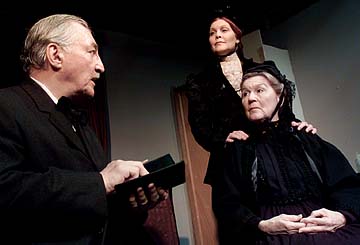


|
Every controversy has at least as many sides to it as the number of people with a stake in the outcome. Playwright Richard Caulfield Goodman and The Actors Group prove the point with "The Insanity Case of Mrs. A. Lincoln." A case for Lincoln
widow’s complexity
By John Berger
jberger@starbulletin.comThe facts are straightforward: Robert Todd Lincoln had his mother certified legally incompetent. He took responsibility for her financial affairs. She was committed to a mental hospital.
Was she insane, or was he a greedy (expletive deleted)? Consider the context: Mary Todd Lincoln was the controversial widow of Abraham Lincoln; she was sitting next to him when he was killed with a gunshot to the head at Ford's Theatre. Robert was the couple's oldest son and the only one of four to reach adulthood. Abraham Lincoln had not been a popular president -- certainly not as popular in life as he would become in the decades following his assassination. As his heir, Robert was keenly aware of his responsibility to protect his father's legacy. His mother's erratic behavior threatened that and put his own position in jeopardy.
Most of Act I is devoted to showing that Mary Lincoln was enough bricks short of a load that she was unable to manage her own affairs. She heard mysterious voices; yelled and screamed for no apparent reason; heard people talking about her in empty rooms; and said that people were following her. She was also a shopaholic.
She was not a popular First Lady -- she spent public funds extravagantly refurbishing the White House while Union soldiers lacked blankets and adequate medical care -- and the press played up the spectacle of the former First Lady trying unsuccessfully to find buyers for her cast-offs when, fearing poverty, she tried to raise funds by selling her old clothes.
The situation had been humiliating for Robert, giving the impression that he wasn't fulfilling his legal responsibilities. So he initiates the court proceedings that will get her committed. Hotel maids testify to her odd behavior, doctors add their informed opinions, and off she goes. Robert becomes trustee of her estate.
In Act II, Mrs. Lincoln smuggles out a message to a sympathetic friend. Their conversations present Mrs. Lincoln's side of the story.
Most of her erratic behavior was probably the result of her ill-advised but innocent mixing of various prescription drugs and over-the-counter remedies. When she got a grip on that, her condition improved. Were people following her? Yes. As her mental condition worsened, Robert hired Pinkerton detectives and paid the hotel staff to keep an eye on her.
An "objective" reporter is enlisted to help the two women retry the issues in the court of public opinion. With the press and public opinion on her side, Mrs. Lincoln is able to embarrass her son, the medical establishment and the court into making a new assessment of her mental state.
Directed by TAG stalwart Brad Powell, "The Insanity Case of Mrs. A. Lincoln" is a superb showcase for Jan McGrath who is fabulous in the title role. McGrath assumes the role so smoothly that Mrs. Lincoln's 19th century vocabulary never gets in the way of the performance. McGrath gets into each nuance of the character. You will feel Mrs. Lincoln's pain and tentatively celebrate her victory.
There is here more pain than anything else as we watch the helpless and bewildered, yet imperious, Mary Lincoln suffer in Act I.
Act II offers a different kind of pain as playwright Goodman and director Powell pound home the message that Mrs. Lincoln was railroaded into the mental hospital by ignorant 19th century male chauvinists.
The audience is left to decide what Robert Lincoln's motives were and whether he was cold-hearted. Anyone who has considered stepping in when a beloved parent appears to be losing control of his or her mental faculties may sympathize with him. We learn at some point that Mrs. Lincoln's relationship with Robert's wife was so corrosive that the couple almost divorced. What could Robert do if qualified medical professionals confirmed his fears that his mother was mentally ill and becoming a danger to herself?
Whatever Robert's concerns and motives were, Goodman includes enough exposure to 19th century perspectives on mental illness and the supposed frailties of "the weaker sex" to discredit the medical and legal establishment -- and make Robert thoroughly suspect as well.
TAG veteran Todd Middleton portrays Robert Lincoln as a cold and distant man. Karen Valasek provides a welcome jolt of energy with her portrayals of the clever and unstoppable female attorney who masterminds the campaign to free Mrs. Lincoln.
Jim Tharp makes his TAG debut as the pragmatic doctor who finds his patient's prognosis improving in direct proportion to the public clamor, and Richard McWilliams contributes another fine performance as the shrewd reporter who agrees to help Mrs. Lincoln if she and her attorney friend stop trying to play him for a fool.
Director Powell adds an imaginative touch by choreographing the numerous set changes as entertainment rather than "invisible" action. Virginia Jones, Ruth Le'au and Jennifer Vea share three speaking roles between them elsewhere in the show but provide welcome interludes in an otherwise grim and stark story as the pert and perky stage crew -- a concept they should build on in remaining performances.
As a footnote: It isn't mentioned in the playbill but Mrs. Lincoln's financial affairs were well-managed for her during the remainder of her life and she never ran out of money. She and Robert were reconciled before her death. Shortly before his death years later, Robert burned papers which he said identified a traitorous member of his father's cabinet but left the files on his mother's insanity case to the care and keeping of his descendants.
"The Insanity Case of Mrs. A. Lincoln"
When: 7:30 p.m. Thursdays through Saturdays, and 4 p.m. Sundays, through Feb. 3Where: Yellow Brick Studio, 625 Keawe St.
Admission: $10
Call: 591-7999
Click for online
calendars and events.